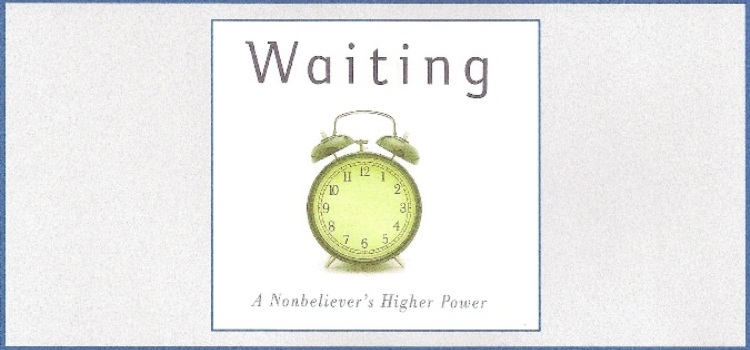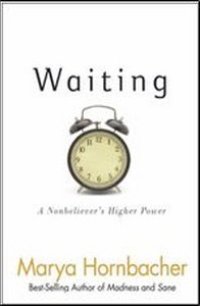Waiting: A Nonbeliever’s Higher Power

A review by John M.
Marya Hornbacher is one enthusiastic and grateful recovering alcoholic. She is also an atheist. If you have been waiting for a recovery book to come along that speaks to the “non-God” in you, then perhaps your patience will be rewarded with the recent publication of Waiting: A Nonbeliever’s Higher Power. When at times you’re feeling a little heretical and you put down the Big Book wishing it had been written somewhat differently, Hornbacher’s text may be for you.
The Big Book, as we know, was written in 1939 and served alcoholics extraordinarily well over the next few decades but its manner of expression does raise problems for the reader of today that earlier generations of alcoholics were less likely to see as problematic: the usage of the male pronoun “he” in reference to both alcoholics and God; a model of the family unit more reminiscent of Leave it To Beaver and Ozzie and Harriet than The Osbournes and Modern Family (note the B.B. chapter, “To Wives”); and a social milieu in which alcoholics, for the most part, were quite comfortable with the language of God and biblical references as the source of the spiritual. Let’s face it, the Big Book is what it is and mirrors its time and place.
However, sometimes the Big Book is read today as if we could freeze time: what was good enough for alcoholics back then is good enough for us now. Happily and gratefully, much of that sentiment is still true today! But for good or ill things began to change in the 1960s with a radical upheaval in social mores and a society-wide critical evaluation of many traditions and nowhere more notably than in religion: Roman Catholicism’s modernization of itself at Vatican Council II in 1962; the increasing liberalization and secularization of religious traditions by both Protestant and Jewish authors (John A.T. Robinson’s Honest to God [1963], Pierre Berton’s The Comfortable Pew [1965], Harvey Cox’s The Secular City [1965], Richard Rubenstein’s After Auschwitz [1966], to name just a few) as well as an increasingly sympathetic Western reception of both Eastern and native spiritualities.
Today, readers of the Big Book may be comfortable with the concept of God that is explicitly or implicitly expressed in its pages. Alternatively, the phrase “God of our understanding” enables some of us to demythologize, demystify, deconstruct, and, yes, even “de-God” its terminology – the Big Book and the Twelve and Twelve allow and even encourage us to do so. Yet for some, the God-centered language remains a barrier and may, in fact, impede an alcoholic’s efforts to stop drinking using AA’s 12 Steps and/or diminish the recovering alcoholic’s enthusiasm for working through the program.
And so we come to Hornbacher’s new book.
Ever respectful throughout its pages to the believer working his/her way through the 12 Step journey, Hornbacher’s focus nonetheless is clearly directed to the nonbeliever who is committed to the Steps, or is still discovering them, when she asks: “How can the Steps be worked in a spiritual way, if we do not believe in a God?” Thankfully, this is not a book that has an ax to grind with those who have found recovery through the God of their understanding. However, Hornbacher does not countenance what she identifies as the inherent assumption of 12 Step literature which implies that sooner or later one will believe in God, nor does she hold that, without God, one necessarily risks losing one’s sobriety. What will keep the nonbeliever (or the believer) sober, however, is a “fit spiritual condition” and her message here is no different than what one reads in the Big Book. How the nonbeliever journeys through the 12 Steps without a belief in God is fleshed out by her in the rest of the 137 pages of her book and those attentive to what she says will, I believe, be richly rewarded. The reader will find that the same principles employed by the Big Book and the Twelve and Twelve like “surrender,” “turn it over,” “humility,” “patience” (waiting!), “service,” “amends,” “inventory,” and many of the others we have come to be familiar with by reading and practising the 12 Step program are highlighted by her in often new, heartfelt ways.
Waiting: A Nonbeliever’s Higher Power is refreshing and a joy to read. Hornbacher is quite simply a gifted and humble writer whose earlier writing includes books on her own struggles with anorexia and bulimia, bipolar disorder as well as last year’s well-received Sane: Mental Illness, Addiction and the 12 Steps. She is a freelance journalist, Pulitzer Prize nominee, novelist, and poet.
The wisdom and compassion contained in the pages of Waiting: A Nonbeliever’s Higher Power cannot help but guide the reader toward a renewed and deeper understanding of a spiritual life which she emphasizes exists right here, right now, in this world. As my atheist wife has said with playful irony, “This book is a Godsend!”
 Waiting: A Nonbeliever’s Higher Power is available as a paperback and a kindle at Amazon US, Amazon Canada and in the United Kingdom.
Waiting: A Nonbeliever’s Higher Power is available as a paperback and a kindle at Amazon US, Amazon Canada and in the United Kingdom.
It is also available as a Kobo, Nook and iBook at online retail outlets.
























